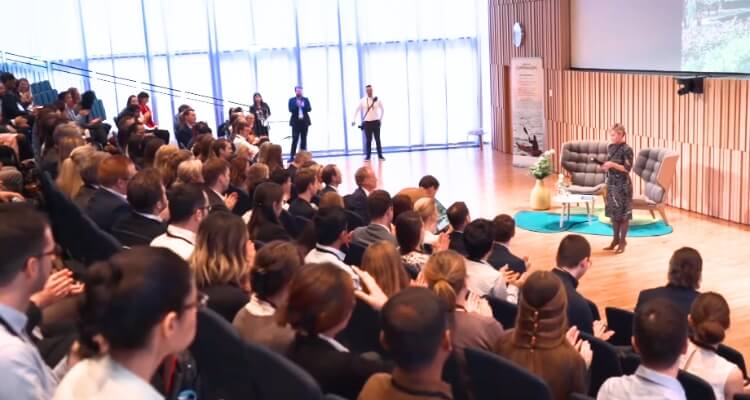Professional growth is the foundation of career success, and attending conferences is a powerful way to maximize this growth. Such events not only provide a platform for learning from industry leaders but also offer invaluable opportunities for networking and personal development.
However, when thinking about joining, one common question may arise: Do I need to be a member of an organization to attend the conference?
No, you usually don’t need to be a member of an organization to attend most conferences. Many events are open to anyone with an interest in the subject. However, certain specialized conferences might require membership to ensure a certain level of expertise among participants, so it’s always best to check the specific guidelines.
Are you curious to learn more about this topic? In this article, you’ll find all the necessary information to understand the requirements for attending a conference and how to make the most of the experience.
Common Purposes of Attending Conferences
Taking part in conferences serves multiple purposes, making them a vital part of academic, professional, and personal growth. For many, conferences offer a unique opportunity to stay updated on the latest developments in their field. Attendees can gain valuable insights and new knowledge at these events which often feature presentations, workshops, and seminars.

Networking is another significant purpose of attending conferences. Through these events, like-minded individuals can form connections, which can lead to collaborations, job opportunities, and mentorships. The interactions during these events can help expand one’s professional network and foster relationships crucial for career advancement.
For students, particularly PhD candidates, conferences offer a platform to present their research, receive feedback, and gain recognition in their field. This visibility can strengthen their academic reputation and open doors to funding or publishing opportunities. Attending well-established events, such as conferences in Canada, or any other country, can also provide access to diverse perspectives and global discussions that enrich their learning experience.
A conference helps attendees identify trends and challenges within their industry, which is essential for staying competitive. Understanding the purposes of attending conferences will help to get the most out of it whatever the requirements for attending conference. By being part of such events, individuals can better understand the broader context of their work and contribute more effectively to their field.
Do I Need to Be a Member of An Organization to Attend the Conference?
The experience of attending a conference can be thrilling and rewarding, offering numerous opportunities to learn, network, and grow professionally. However, many potential attendees often wonder about the necessary steps and conditions to participate. Understanding the requirements for attending a conference is key to ensuring a smooth and successful experience.
Membership and Conference Participation
A conference does not always require membership in an organization. Many conferences are open to anyone interested in the subject matter, regardless of their affiliation. Some specialized events may require attendees to be members of the hosting organization to maintain a certain level of expertise. Checking the conference guidelines will clarify if membership is necessary.
Open Access to Conferences
Many conferences are designed to be accessible to a wide audience. These events welcome participants from various backgrounds and do not impose strict membership conditions. It provides a variety of exchange of ideas and an inclusive environment where professionals, students, and enthusiasts can engage and learn from one another.
Specialized Conferences with Specific Requirements
Some conferences, particularly those dedicated to specific fields or professional groups, may have specific requirements, including membership in related organizations. As a result of these requirements, participants can engage in deeper discussions and form better relationships. It’s important to review these requirements well in advance.
Understanding Conference Expectations
Beyond membership, understanding the broader requirements is essential. Be aware of registration deadlines, understand if there are any requirements for participation, such as submitting an abstract or paper, and prepare for specific sessions. Meeting these requirements ensures that you can fully participate in the conference and benefit from all it has to offer.
Making the Most of Conference Attendance
To maximize the benefits of attending a conference, it’s helpful to familiarize yourself with the event’s structure and expectations. It is important to know whether membership is required and to prepare in advance for networking opportunities. For example, students pursuing higher study should be aware of the benefits of conference attendance for PhD candidates.
Your conference experience can be significantly improved if you plan carefully and understand the different requirements. Whether or not membership is necessary, being informed about the expectations and guidelines will help you make the most of the opportunities available at the event.
Are There Any Special Requirements to Attend a Conference?
Yes, conferences have special requirements. These criteria ensure that the event is relevant and beneficial to all participants. Being aware of them can help you prepare adequately for the experience. The following are some special requirements for attending a conference:
- Registration Completion: You must complete your registration before the event. This includes payment and providing necessary information to the organizers.
- Identification Verification: Attendees often need a valid ID. This helps maintain security and verifies conference registration.
- Respect to Code of Conduct: Most conferences have a code of conduct. Maintaining a respectful work environment requires following these guidelines.
- Required Knowledge: Some conferences require specific knowledge or skills. This ensures that the content is relevant and engaging for all participants.
- Membership Requirements: Members of the host organization may be required to attend some conferences. This can sometimes offer additional benefits like discounted rates.
- Special Equipment: Depending on the conference, you might need specific tools or devices. This is especially important for technical or interactive sessions.
Attending a conference may require a variety of requirements, but they are all designed to improve the participant’s experience. Be sure to check these details well in advance to avoid any last-minute surprises.
How to Register for a Conference?
The registration process for a conference involves several key steps. By carefully following each stage, from selecting the right event to completing your registration, you can ensure a successful and rewarding conference experience.
Step 1: Select the Right Conference
Begin by selecting the conference that best suits your professional goals and interests. Ensure it’s a credible event by identifying reputable conferences through research. Check the organizers’ credentials, past conference reviews, and the event’s history to confirm its reliability.
Step 2: Visit the Official Conference Website
Once you’ve identified a reputable conference, visit its official website. This site will have all the necessary information about the event, including registration details, schedules, and participation options. Ensure you’re on the correct site to avoid scams.
Step 3: Complete the Registration Form
Locate the registration form on the website. Carefully fill out the required information, such as your name, contact details, and professional background. Double-check your entries to avoid mistakes, which could delay your registration process.
Step 4: Select Your Participation Options
Choose how you want to participate in the conference, whether in-person or virtually. Some conferences may offer additional options, like workshops or special sessions. Select the ones that best align with your interests and professional needs.
Step 5: Make the Payment and Confirm the Registration
Once you have selected your participation options, you can proceed to the payment process. Most conferences accept various payment methods, such as credit cards or online payments. A confirmation email should be sent once your payment has been processed.
A careful registration process can improve your conference experience. By following these steps, you ensure a smooth and successful registration, setting the stage for a productive event.
Factors You Can Keep in Mind While Attending a Conference
The opportunities for professional growth and networking can be significant when you attend a conference. To maximize your experience, it’s wise to go in prepared and with a clear plan. Here are some key factors to keep in mind to make the most of your time:
- Set Clear Objectives: Identify what you aim to achieve by attending the conference. Setting goals helps you focus on relevant sessions and activities.
- Plan Your Schedule: Review the agenda carefully and plan your day around key sessions that align with your goals. This ensures you don’t miss valuable presentations.
- Networking Opportunities: Try to connect with other attendees and speakers. Networking can open doors to future collaborations and career opportunities.
- Note-Taking: Bring note-taking tools, whether digital or traditional. Capturing insights and information during sessions is crucial for later reflection.
- Engage Actively: Participate in discussions and workshops instead of observing. Active engagement enhances learning and helps you connect with your peers.
- Analysis and Feedback: Provide feedback on the sessions you attended, if requested. It is important to assess conferences to improve your conference experience in the future.
By keeping these factors in mind, you can achieve a productive and rewarding conference experience.
Frequently Asked Questions
Here are some of the most common questions and their answers to help clarify whether you need to be a member of an organization to attend the conference and what to expect regarding costs, registration, and other details.
Can Non-Members Attend the Conference at the Same Cost as Members?
Typically, non-members do not pay the same registration fee as members. Non-members usually face higher fees to attend the conference compared to members. This difference in cost is common because members often receive discounts as a benefit of their membership. To get precise information about the costs, it is best to check the conference’s official website where detailed pricing information is usually provided.
Is It Possible to Register for The Conference On-Site?
Yes, it is possible to register for most conferences on-site, but there are some things to keep in mind. On-site registration is often available but usually costs more than early registration. Additionally, some sessions or events within the conference might be fully booked, so registering early online is generally recommended to ensure your spot and save on fees.
What Is the Refund Policy if I Cannot Attend the Conference?
It’s important to review the specific refund policy for the conference you’re attending before registering. Generally, conferences offer a full or partial refund if you cancel your registration before a certain date. However, after that date, refunds might not be available or limited to a partial amount. Always check the conference’s website for their exact refund policy.
Can I Upgrade My Conference Pass from Non-Member to Member On-Site?
Your conference pass may be upgraded from non-member to member on-site, but it depends on the conference. Some conferences allow you to make this upgrade at the registration desk during the event. If this option is available, you might need to pay the difference in fees, and you should check with the conference organizers or registration desk for availability and the specific pricing involved.
Are Student Discounts Available for Non-Member Students?
Yes, student discounts are often available for non-member students at many conferences. These discounts are designed to make the conference more accessible to students who may have limited budgets. When registering online or on-site, you must provide valid student identification to qualify for these discounts. Check the conference website for the exact details and discount amounts.
Do Non-Members Can Attend the Conference Virtually?
Yes, many conferences offer virtual attendance options for non-members as well as members. In some cases, virtual attendance is offered at different pricing levels, with non-members usually paying more than members, so you can participate remotely. You can find out more about virtual attendance fees and what’s included on the conference’s official website or by contacting the organizers.
Conclusion
A conference can be a valuable experience for both professionals and individuals. As you’ve discovered, the answer to the question, “Do I need to be a member of an organization to attend the conference?” is generally no. Most conferences are open to all, though some specialized events may have specific requirements, so it’s always important to check the details.
To ensure you make the most of your conference experience, set clear objectives, plan your schedule, and actively engage in networking opportunities. These simple steps can greatly improve your time at the event. Best wishes as you prepare for and enjoy your next conference!







